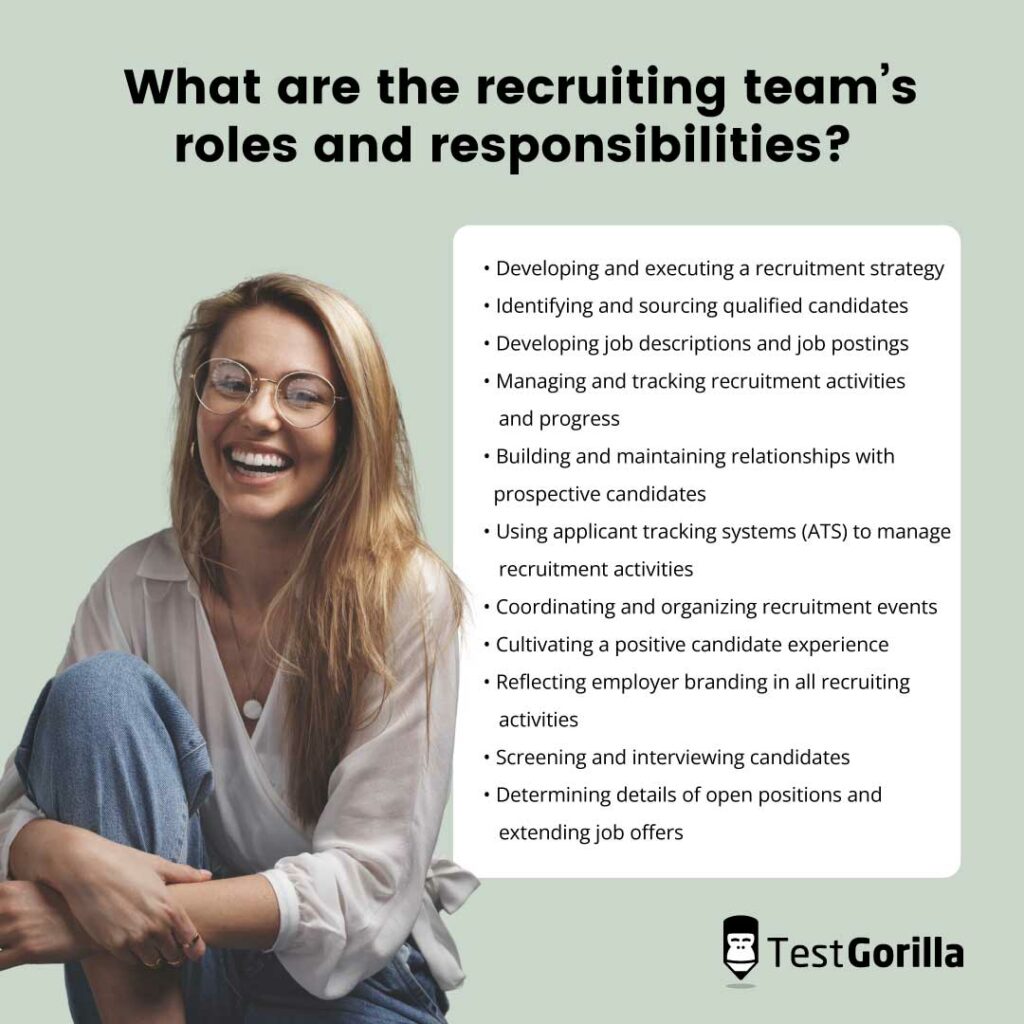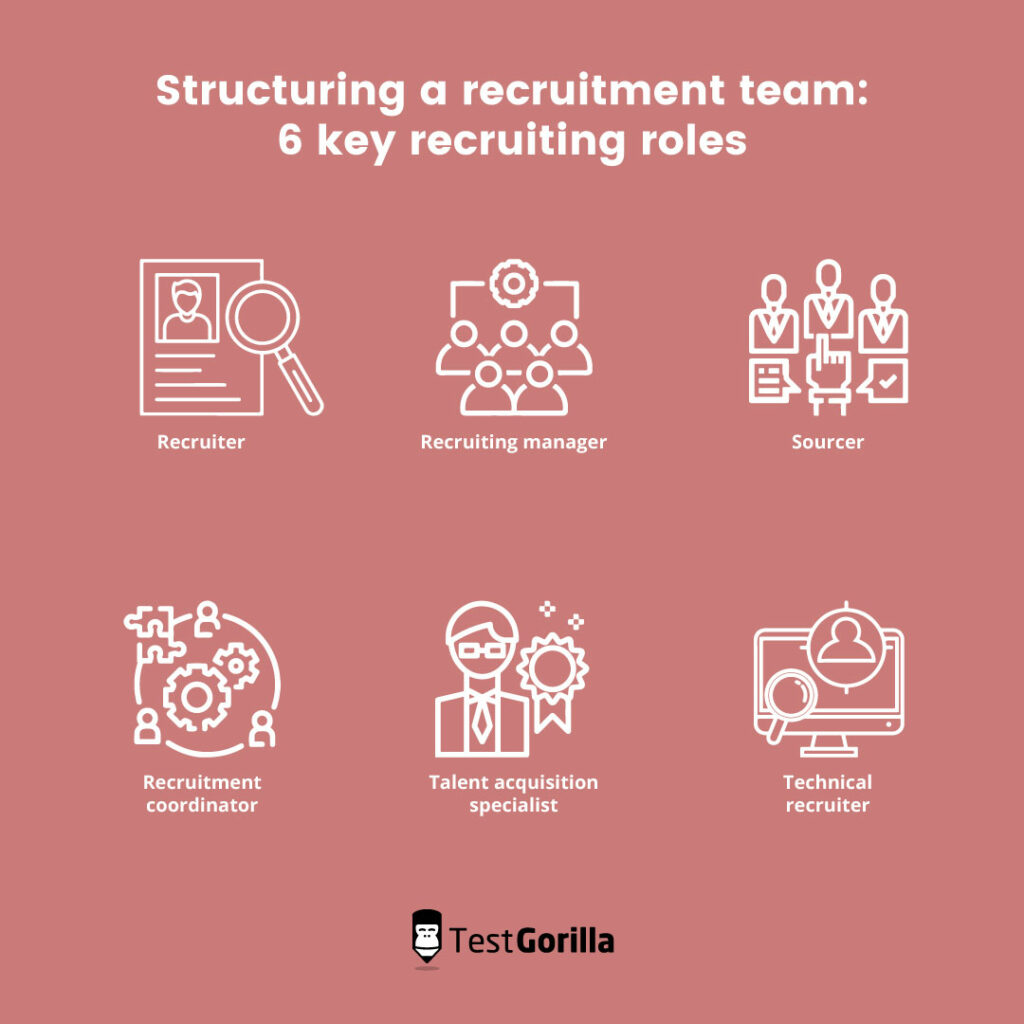Recruiting the right people for any role is one of the most important tasks any business faces. Yet, finding the right people to fill recruiting roles is even more important. After all, these are the people who will help you not only expand your teams but help your business thrive by recruiting only the best candidates.
But which of the key recruiting roles does your business need to fill to help you accomplish your business objectives?
What combination of skills does each role require to help you build great teams? And how can you assess the skills of your future HR and recruiting staff objectively and accurately?
In this article, we’ll take a look at the responsibilities of recruiting teams and how to determine which recruiting roles your business needs to hire for. Then, we’ll provide a deep dive into the six key recruiting roles, the skills needed for each position, and when you should consider recruiting for each role.
What are the recruiting team’s roles and responsibilities?
Whether your recruiting team consists of one person or twenty, there are certain roles and responsibilities that this team is in charge of.
Keep the following roles and responsibilities top of mind when considering the scope of your recruiting team’s missions and tasks:
Developing and executing a recruitment strategy
Identifying and sourcing qualified candidates
Developing job descriptions and job postings
Managing and tracking recruitment activities and progress
Building and maintaining relationships with prospective candidates
Using applicant tracking systems (ATS) to manage recruitment activities
Coordinating and organizing recruitment events
Cultivating a positive candidate experience
Reflecting employer branding in all recruiting activities
Screening and interviewing candidates
Determining details of open positions and extending job offers
How to determine the key recruiting roles your business needs
Many factors go into creating a strong recruitment team. Let’s take a look at the main considerations to make when deciding which recruiting roles you need.
1. Analyze your current recruitment processes and structure
Start by evaluating your current recruiting processes and how they benefit your hiring needs. Pay close attention to the people that are currently involved, which tasks they take on, and the state of your current recruiting metrics such as time to hire.
For example, some small businesses don’t have a dedicated recruiter, and instead, rely on heads of departments to manage the bulk of the recruiting and hiring processes. This can often distract from their main duties and cause inefficiencies elsewhere in the business.
Other businesses might find that one person in the HR department – who is not in a formal recruiting role – is taking on the majority of recruiting tasks and is performing well. In this instance, the organization might consider moving them into a formal recruiting role or adjusting their job description to reflect this.
This first step will enable you to identify roles that could be eliminated or combined and give you a good idea of any further recruiting roles you need to hire for.
2. Analyze your workforce and talent needs
Secondly, evaluate your current workforce and the types of roles that you need to fill in the short and long term. For example, if your business has aggressive growth goals over the next year, you might want to consider expanding your current recruitment team.
3. Consider your budget and the size of your organization
When it comes to the structure of your recruitment team, the size of your business and your budget will play a huge role in determining which recruiting roles you need.
While small businesses and startups might only need one dedicated recruiter, larger businesses will need a bigger recruiting team to handle the hiring volume and associated processes.
The best insights on HR and recruitment, delivered to your inbox.
Biweekly updates. No spam. Unsubscribe any time.
Structuring a recruitment team: 6 key recruiting roles
While there is no perfect recruitment team structure – your in-house recruitment team structure will depend on the factors above – there are several recruiting roles that you should consider.
Here are the six key recruiting roles to keep in mind when assembling your recruitment team structure.
1. Recruiter
Recruiters are responsible for all aspects of the recruiting process, including sourcing candidates, coordinating interviews, writing job descriptions, assessing candidates, and engaging in different recruitment-marketing activities.
The recruiter is usually the first recruiting role that organizations hire for, because they perform key recruiting and hiring tasks.
What qualifications and skills do recruiters need?
Recruiters often have a bachelor’s degree in human resources or a related field, and/or a strong background in recruiting. Some recruiters also specialize in recruiting in specific industries.
They should also be familiar with recruiting and hiring software tools such as ATSs, Human Resource Information Systems (HRIS), and pre-employment testing solutions.
Recruiters need the following core skills:
Relationship-building skills
When you might need a recruiter
You might need a recruiter if:
Your business is expanding and you don’t have a dedicated recruiting function
You’re hiring for a role with a small talent pool
You want to streamline your recruiting processes and save time and money
2. Recruiting manager
Recruiting managers (or recruitment managers) are responsible for managing a business’s entire recruiting strategy, including creating recruiting workflows, identifying opportunities for improvement, and keeping track of recruiting metrics.
They’re also responsible for managing recruiters, implementing recruitment best practices, and overseeing interview processes.
What qualifications and skills do recruiting managers need?
Recruiting managers may have a degree in human resources management, and/or experience in managing teams of recruiters. They’ll also need good knowledge of local labor laws, experience in working with different job advertising techniques, and be up-to-date on the latest recruiting and hiring software.
Recruiting managers need the following core skills:
Strong decision-making skills
When you might need a recruiting manager
It might be time to hire a recruiting manager if:
You have more than one recruiter
You have ambitious growth goals
You want to implement a new recruiting strategy
3. Sourcer
Sourcers solely participate in the initial phases of the recruitment process and are experts in using several different channels such as resume databases, social media, job boards, and professional networks to source the best candidates for vacant positions.
They are also skilled in contacting passive candidates and building talent pipelines to benefit an organization’s long-term hiring needs.
What qualifications and skills do sourcers need?
Sourcers will be adept in using various sourcing techniques such as crafting Boolean search terms, will have experience with HR platforms and candidate management systems, and will know how to create candidate funnels for hard-to-fill positions.
Sourcers need the following core skills:
Marketing skills
Networking skills
Relationship-building skills
Communication skills
When you might need a sourcer
You might need a sourcer if:
You want to build a solid talent pipeline
You’re hiring for a role with a limited talent pool
You want to promote your employer brand
4. Recruitment coordinator
Recruitment coordinators are junior employees that support recruiters, sourcers, and recruiting managers in their efforts to recruit candidates.
They manage the logistical processes to help cultivate the recruiting funnel, including posting job listings, coordinating interviews and travel, preparing offer letters, scheduling interviews, and conducting background checks.
What qualifications and skills do recruitment coordinators need?
While recruitment coordinators don’t necessarily need a college degree, they should have relevant experience in administrative support for recruiting teams or a related area.
Recruitment coordinators need the following core skills:
Strong organizational skills
The ability to work collaboratively
Time-management skills
When you might need a recruitment coordinator
You might decide to hire a recruitment coordinator if:
You need extra support in your recruiting efforts
Your company is expanding
5. Talent acquisition specialist
Talent acquisition specialists are responsible for enacting proactive and long-term recruiting strategies to build talent pools and pipelines that align with business needs.
They analyze a business’s current workforce and growth strategy to create hiring strategies to source, attract, and recruit candidates for future vacant positions. They’ll also engage in talent mapping to identify and analyze organizational vulnerabilities and build a strategy to fill skills gaps.
What qualifications and skills do talent acquisition specialists need?
Talent acquisition specialists should have experience in recruiting and hiring roles and a solid foundation of HR knowledge.
They should also have in-depth knowledge of talent management and recruiting strategies, an understanding of full-cycle recruitment processes, and experience with using relevant recruiting software to build talent pipelines.
Talent acquisition specialists will need the following core skills:
Strong communication skills
Interpersonal skills
Solid HR management knowledge
Organizational and time-management skills
When you might need a talent acquisition specialist
It might be time to hire a talent acquisition specialist if:
You want to future-proof your business’s talent pipeline
Your leadership is mapping the future and growth goals of the company
6. Technical recruiter
Technical recruiters are responsible for sourcing and recruiting candidates to fill IT and technology positions such as data scientists and software engineers. They have technical knowledge that general recruiters don’t have, enabling them to find candidates with the right technical skills for each position.
Just like general recruiters, technical recruiters are responsible for all aspects of the recruiting process, including writing job descriptions, sourcing and screening relevant candidates, and scheduling interviews.
What qualifications and skills do technical recruiters need?
Technical recruiters often have a background in tech and in recruiting.
They’ll also be familiar with recruiting and hiring software tools such as ATSs, Human Resource Information Systems (HRIS), and skills testing platforms. In most instances, they’ll have specialized knowledge about a specific segment of the tech industry (e.g., IT, SaaS, or e-commerce).
Technical recruiters need the following core skills:
Relationship-building skills
When you might need a technical recruiter
You might need a technical recruiter if your business is becoming more tech-focused and wants to hire more It or technology professionals.
Build the best recruiting team with pre-employment skills testing
Whether you’re just starting to build a recruitment team or expanding your current one, you’ll first need to analyze your workforce plan and talent strategy and determine your business priorities. This will give you a solid idea of which key recruiting roles you need to add to your team.
Once you start recruiting, you’ll then need to assess candidates to make sure they have the right recruiting skills to be successful in their roles.
With TestGorilla, you can test candidates’ soft and hard skills with a pre-employment skills assessment consisting of up to five tests. For example, you can combine our free Talent-acquisition test with other tests such as our Communication, Time Management, and Attention to Detail tests.
To find out more about how TestGorilla can help you fill key recruiting roles with the best candidates, sign up for a free demo today
Related posts
You've scrolled this far
Why not try TestGorilla for free, and see what happens when you put skills first.




















